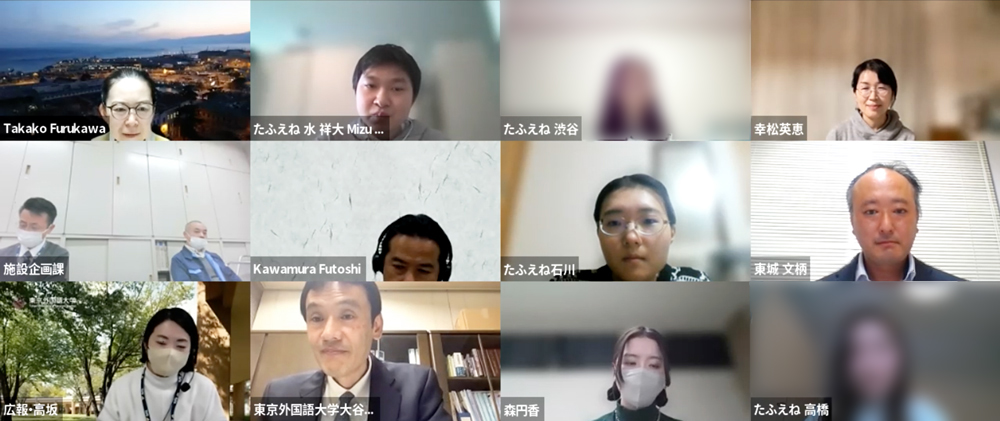Students, Faculty and Staff Discuss TUFS’ Efforts to Go Carbon Neutral
December 13, 2022
On Tuesday, December 6, 2022, at the suggestion of the environmental student organization TUF-ENE, a roundtable discussion was held between TUF-ENE students and faculty members on the topic of TUFS’ efforts to go carbon neutrality. The roundtable discussion was attended by five students from TUF-ENE (Representative: Ms. Meika Takahashi, Vice Representative: Mr. Shodai Sui), TUFS Director and Secretary General Keisuke Otani, Director of the Graduate School of Japan Studies Futoshi Kawamura, Associate Professor Bumpei Tojo ( World Language and Society Education Centre), Associate Professor Hanae Yukimatsu (Graduate School of Global Japanese Studies), Project Assistant Professor Takako Furukawa (TUF-ENE advisor, Center for World Language and Society Education), and staff from the Facilities Planning Division participated.
The roundtable discussion was held with the aim of setting concrete goals for carbon neutrality in terms of research and hardware, in order to encourage more students to participate in the university’s efforts, and to show people inside and outside the university that we are willing to consider the goal together.
First, based on past activities and discussions within TUF-ENE, a proposal was made to formulate a charter for action toward the goals. Director Otani explained the current status and challenges in terms of operation in this era of energy crisis. Comments from the faculty members included, “In my Japanese classes, I often cover topics related to the SDGs, and I feel that international students, in particular, are interested in environmental issues. I think that our university, where students learn about various regions of the world, is an easy place to bring up discussions”; “The goals of the SDGs often have items that conflict with each other. I think it is difficult to know how our university should act”; and, “The contradictions in the SDGs can be clarified by the members of our university, including students who conduct regional studies in various regions of the world, by sharing the problems that each region is facing and sharing information with each other;” “While there are many top-down charters, I think it would be good for TUFS to create a unique bottom-up approach by building up opportunities for study groups and dialogue among students.”
The university plans to continue to provide various opportunities for discussion among students and faculty members in order to become carbon neutral.

